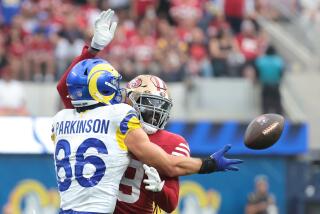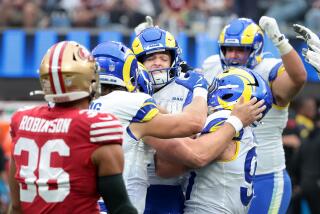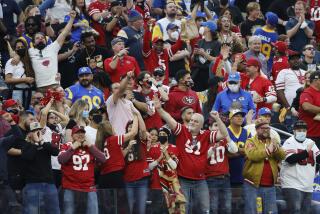Rams Not Eager to Face Montana : They Are Among the 49er Quarterback’s Biggest Fans
Lines formed early this week at Rams Park as coaches and players queued up to praise the league’s most prominent wallflower, San Francisco 49ers quarterback Joe Montana.
Having just seen footage of Montana’s latest exploits--a remarkable fourth-quarter, four-touchdown performance against the Philadelphia Eagles last Sunday--the Rams couldn’t help but trip over their adjectives. They hyperbolized themselves silly. They did everything but request tickets to Montana’s inevitable Hall of Fame induction ceremony.
Coach John Robinson set the tone by declaring that Montana “just maybe” is the best quarterback ever to play the game. Had he been pressed, Robinson probably would have disposed of the qualifier, such is his admiration for Montana.
Next up was cornerback Jerry Gray, who said he still remembers watching a Montana-led Notre Dame team defeat his beloved University of Texas back in 1978. Gray, born and reared in Lubbock, Tex., was in high school at the time, but he recalls thinking that Montana possessed something special. The years have not changed his mind.
“He’s still the same old Montana,” he said. “As far as making the plays (goes), he’s the best.”
And the most exasperating, too. Defensive tackle Doug Reed, who has done his share of chasing the elusive Montana, said he would contribute to any retirement gift for the 49er quarterback. In fact, the sooner, the better.
“Sure, I’ll send him the limo,” Reed said. “When you want to do it? You want to do it this week? That would be a great time, to do it this week.”
Sure it would. The Rams travel to Candlestick Park Sunday to face the undefeated 49ers and, ta-da, Montana, who historically has a knack of picking on Robinson’s team. What a wonderful gesture it would be, said Reed, laughing, if Montana announced his retirement shortly before kickoff.
No such luck. Montana will be there, as usual, his history of picking apart Ram secondaries securely intact. Already this season, he has thrown seven touchdown passes and completed about 66% of his attempts. His quarterback rating, that confusing collection of statistics mixed together like a margarita, places him second in the entire National Football League.
But never mind all the numbers. When people speak of Montana, they speak of his presence, his aura. You don’t need a calculator to figure his worth there. Just glance at the three Super Bowl rings Montana owns.
“I don’t think there’s any sense comparing him with anybody playing (now),” Robinson said. “He’s done far more than anybody else has. He’s made comebacks, won championships, done phenomenal things, run for touchdowns, thrown for touchdowns, led comebacks, had a back operation. He’s unparalleled in my experience in this game.”
And while there are other quarterbacks in the league with stronger arms (John Elway), stronger bodies (Jim Kelly), faster legs (Randall Cunningham), there is no one, said Gray, who approaches Montana’s knack at mini-miracles. “Whenever it’s like, ‘Joe, we need this,’ he’ll get them in that position to do it. You can count on him to get them there.”
Against the Eagles last Sunday, Montana completed 11 of 12 fourth-period passes for 227 yards and those four touchdowns (a team record). In all, he completed 25 of 34 attempts for 428 yards and five scores. It was a memorable effort, one that few people will forget, except maybe Montana, who isn’t much for reliving the past.
Questions about his celebrated back injury of 1986 fall on uninterested ears. Requests to compare recently retired coach Bill Walsh and new Coach George Seifert are basically ignored. As for reaction to the many Ram compliments, Montana simply says thank you and moves on.
“I don’t pay much attention to it at this point,” Montana said. “Someday, when it’s all over, then I’ll sit back and reflect on it, but not now.”
When he does, Montana will likely remember 1989 as the season that begin without a quarterback controversy. Seifert, unlike Walsh in 1988, made it clear in training camp that Montana was the starter and that Steve Young was the backup. Odd as it may seem for someone who just led their team to a Super Bowl victory, Montana appreciated the gesture.
“I think I’m somewhat more relaxed,” he said. “But I still have that same approach.
“Early on, hopefully, that’s something that doesn’t weigh on my mind.”
Not to worry, said Seifert, who described his decision to name Montana the starter as “an easy thing to do.”
Predictably enough, Seifert hasn’t tinkered too much with the 49er offense. If anything, he said, Montana’s success can be partly traced to Walsh’s offensive attack, which has evolved, along with Montana, during the last 10 years. So, Seifert said, why break with tradition?
There are other things that haven’t changed since Seifert became Montana’s new boss, most noticeably the inherent need to win. Montana thrives on it. In fact, he takes exception to the prevailing wisdom that few teams repeat as Super Bowl champions because of a mental letdown.
“I disagree with that whole outlook,” he said. “I think once you’ve been to the Super Bowl . . . there’s no feeling like that. Anything short of that, to me, would be a letdown and not the other way around. (It’s not that) ‘we don’t need to win because we won last year.’ People say we can’t win, but, hey, we want to go back. We’ve been there and know that feeling. I think it would make us hungrier more than anything.”
Montana certainly has the appetite for a return visit. Asked how he would assess his season so far, his voice took on a slightly disgusted tone.
“I’ve played all right, but there are a lot of things I think I could have done better,” he said.
Is that so? The Eagles, 38-28 losers to Montana and the 49ers, would probably disagree. And so would the Rams, who saw the whole thing on film. To them, there is no one better than Montana--no matter what Montana says.


